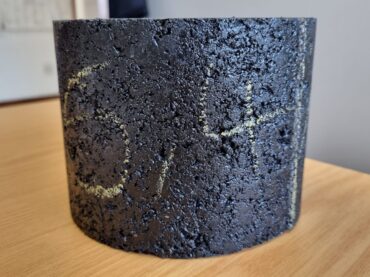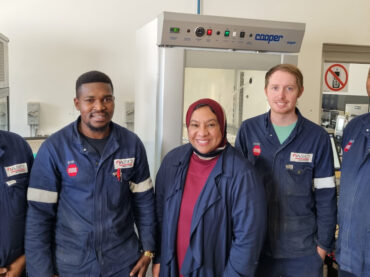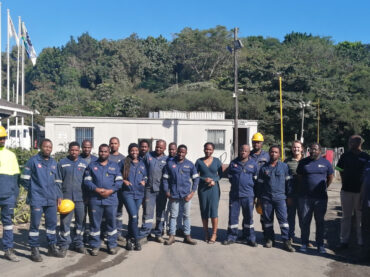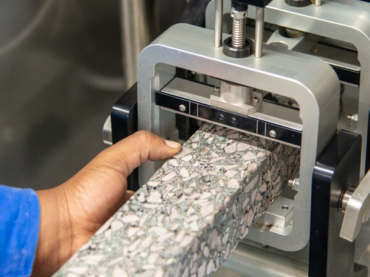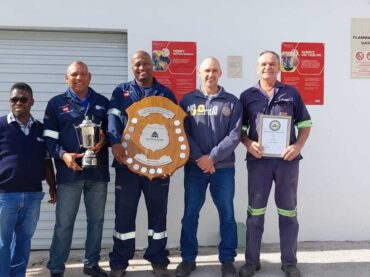- View All
- Awards
- Bitumen
- Quality
- SAPREF'S CLOSURE
12th Jun 2023
The South African asphalt industry is working hard to reduce its carbon footprint and improve sustainability by using waste materials to provide road surfaces that last longer. AECI Much Asphalt recently completed a successful trial using non-recyclable glass in the asphalt layer. As this concept continues to develop, another potential game-changer is being tested. This time it is Instant Bio-Bitumen, a carbon-negative alternative to conventional bitumen derived from the refining of crude oil for use as the binder in asphalt products. Instant Bio-Bitumen combines asphaltenes extracted from naturally occurring hydrocarbon resins with a maltene component derived from waste cashew nut shells. It can be produced by blending the ingredients or introducing them individually during the asphalt manufacturing process. The bio-bitumen dramatically reduces the SHEQ risks associated with traditional bitumen derived from crude oil, reduces total CO2 emissions in asphalt production, and provides a convenient solution for asphalt production in remote locations. “International bitumen supply has been negatively impacted by the IMO 2020 regulations, which limit Sulphur in fuel oil for ships to 0.50% for marine fuels globally, as well as the international move to green energy. In South Africa, the closing down of refineries and limited capacity of those that remain means asphalt manufacturers must import most of their bitumen requirements,” explains Herman Marais, Director: Plant & Technical at AECI Much Asphalt. “We need new solutions, and the development of alternative binders for flexible pavements that decrease impact on the environment is a significant breakthrough,” he says. Morne Labuschagne, Technical Manager: Bitumen at AECI Much Asphalt, adds that several bio-bitumen products containing few to no petrochemical-derived materials are commercially available internationally. “We decided to investigate Instant Bio-Bitumen for use in South Africa due to its novel recipe and recent success in Europe.” A study at AECI Much Asphalt’s Central Laboratory in Cape Town in 2022 compared the properties of a traditional asphalt mixture manufactured with 50/70 penetration grade bitumen from a local refinery and an asphalt mixture using Instant Bio-Bitumen. According to Labuschagne, the results showed that the properties of the traditional asphalt mixture using the wet blend process were similar but generally inferior to the dry blended asphalt mixture using Instant Bio-Bitumen. In February 2023 a plant trial was conducted at AECI Much Asphalt’s Contermankloof site in the Western Cape but not evaluated in detail due to lower-than-expected binder content. A second trial is planned, with the asphalt mixture to be donated to a primary school for repairs and maintenance to parking areas, walkways and access roads. “We are planning more paving trials on higher volume roads in the Western Cape,” says Labuschagne. “We are also conducting more research using aggregates from different sources and Instant Bio-Bitumen with various asphaltene/maltene ratios. The incorporation of Instant Bio-Bitumen in warm mix asphalt with high ratios of reclaimed asphalt is the next step in our investigations.” AECI Much Asphalt continues to explore alternative sustainable recycling streams for various other waste materials such as foundry sand, waste shock tube generated by the explosives industry, Sulphur by-products and filter cake generated during mineral oil recycling. Watch this space.
17th Nov 2022
In 2006 AECI Much Asphalt’s Central Laboratory in Cape Town became the first asphalt testing laboratory in South Africa to achieve accreditation from the South African National Accreditation System (SANAS). Cenlab, as it is known, has now taken this significant step further to become the only fully accredited bitumen and asphalt laboratory in South Africa, reports AECI Much Asphalt Managing Director Bennie Greyling. Firyaal Moos, Cenlab Manager, elaborates that all the current specialised testing carried out at the laboratory has been audited and accredited in a step that ensures the facility is 100 per cent covered by SANAS. This includes Dynamic Modulus & Flow, Hamburg Wheel Tracker, Fatigue Life and Dynamic Creep, PG bitumen testing, as well as rubber testing techniques encompassing Dynamic Viscosity, Flow, Compression Recovery, and Ball Penetration & Resilience. Extension of scope “Our Central Laboratory now has SANAS accreditation for all the relevant aggregate, binder and asphalt test methods.” “Cenlab has been SANAS accredited for a large number of test methods for the past 16 years and we have been audited every 18 months since then,” Moos explains. ‘’However, testing methods have developed and changed over the years, and we recently applied for an “Extension of Scope” to include the most recent test methods, as well as others for which we have not previously been accredited. These advanced asphalt and bitumen rubber tests methods were the focus of the latest audit.” She adds that SANAS accreditation begins with assessment of the laboratory systems, including staff, equipment maintenance, calibrations, and verifications, followed by the test methods. Additional test methods can then be included through the “Extension of Scope” process. 14 additional test methods “Since August 2006 Cenlab has been accredited for Marshall Testing, SANS bitumen test methods and SANS aggregate test methods. We included six additional Performance Grade Bitumen test methods in April 2022, and the final eight test methods in October 2022.” While the SANAS Accreditation applies to an AECI Much Asphalt facility, subsidiary AECI SprayPave participates in its correlation testing programmes and Cenlab plays a major role in AECI SprayPave’s binder testing and product development. “We are delighted that Cenlab is now 100% accredited, ensuring that we produce high quality test results which are continuously monitored and analysed through the checks and balances we have in place,” says Moos. “Our daily activities incorporate equipment calibrations and verifications, regular updating of test methods, and continuous staff training. It is essential for us to keep up to date with the latest developments in specifications and testing regimes. Our SANAS accreditation also requires our involvement in both inter- and intra-laboratory comparative testing programmes for all our accredited test methods.” Sustaining relationships She points out that AECI Much Asphalt aims to provide its clients with world class service and the peace of mind of knowing that test results are supported by stringent management systems to ensure quality and conformity. “What Firyaal Moos and her team have achieved is truly remarkable and we are very proud of our flagship laboratory,” says Bennie Greyling.” “AECI Much Asphalt has built strong, lasting industry relationships in the past 50 years and I believe Cenlab’s latest success will help to sustain these relationships.” Moos attributes Cenlab’s long-term success as a SANAS-accredited facility to hard work and dedication, together with the best efforts of her team to keep pace with changes and developments in the industry. “Teamwork is key, and every team member plays a very important part in ensuring overall success.” The Benoni Laboratory in Gauteng has also upgraded significantly in recent years to offer all the most up-to-date testing equipment and techniques and is well on the road to its first SANAS audit. “We are learning from the Cenlab team and will try to emulate their outstanding achievement in the near future,” says Joanne Muller, AECI Much Asphalt Inner Region Technical Manager.
17th Nov 2022
Congratulations to the AECI Much Asphalt team at our Coedmore plant in KZN for taking first place in its category at the MBSA’s 2022 National Safety Competition. Coedmore also received special recognition from MBSA for achieving more than 2 million manhours worked without a Lost Time Injury. Team Coedmore has maintained its Zero Harm culture and this focus has paid off handsomely!
23rd May 2022
World class development and testing facilities enable AECI Much Asphalt and subsidiary AECI Spraypave to offer clients consistently high product quality from design to delivery and placement. This is no easy task as local laboratories must conform to international best practice while also meeting the specific demands of the local industry, points out Joanne Muller, Manager of the AECI Much Asphalt Gauteng Regional Laboratory. AECI Much Asphalt’s Central Laboratory at the Cape Town head office and its Gauteng Regional Laboratory in Benoni are fully equipped for Sabita’s recently updated Manual 35 guidelines on the design and use of asphalt in road pavements. With the focus on Spraypave’s product offering, both also offer full performance grading (PG) capability on binders in line with SATS 3208:2019. To operate optimally and offer industry the best quality control possible, AECI Much Asphalt also offers testing capabilities that surpass current industry requirements on aspects such as moisture induced sensitivity testing as well as bond strength testing, to name a few. “We are one of three Industry stakeholders capable of analysing the chemical composition of bitumen by means of a SARA analysis and one of only two with Fourier Transform Infrared (FTIR) Spectroscopy capability,” explains Morne Labuschagne, Technical Manager – Bitumen at AECI Much Asphalt. “The FTIR technology used mainly to determine oxidation levels as well as polymer concentrations and types of bituminous binders.” Capacity squeeze Joanne Muller says industry uptake and implementation of Sabita Manual 35 based performance asphalt designs have been slow and staggered since its initial publication in 2015. “Significant capital outlay is required to gear up for these designs and AECI Much Asphalt started the process immediately. The capacity that would be required was largely unknown, so many commercial laboratories in South Africa delayed the capital investment. It has become clear that more capacity is needed, and many laboratories are only now establishing this test capability.” Accelerated Sabita Manual 35 design implementation on contracts over the last two years has placed tremendous strain on the AECI Much Asphalt facilities as there are more designs required than equipment to perform them, Muller adds. “Specific tests such as Four Point Bend Fatigue testing are very time intensive, which compounds the problem.” AECI Much Asphalt has added fatigue testing devices in both laboratories to enable increased throughput and stay ahead of the curve. The company has also commissioned more gyratory compactors and vacuum sealed devices at its production facilities in the past year to align process control and Manual 35 design activities. A new gyratory compactor at the Central Laboratory not only increases capacity in arriving at the final answer once compaction is completed but enables observation during the compaction process, using sophisticated torque transducers built into the device. “This functionality helps us to understand the compaction behaviour of asphalt mixtures, evaluate the risk of material breakdown during compaction, and optimise mixtures for workability for example,” says Muller. Constantly evolving The AECI Much Asphalt Central Laboratory will commission an Epifluorescence Microscope at the end of April 2022, taking polymer modification to the next level in terms of product quality and process efficiency. “Global technology is always changing and improving, and our technical team continuously assesses how we can look at things differently to make the puzzle pieces fit,” says Muller. “We are currently exploring testing and the associated equipment required for semi-circular bending as a possible fatigue quality control measure, as well as binder shear ratio testing as a fatigue predictor.” In a move to expand the group’s design and testing footprint, a new laboratory is being set up at the AECI Spraypave plant in KwaZulu-Natal to complement the services in Gauteng and the Western Cape. A dynamic shear rheometer (DSR), used to characterise the behaviour of asphalt binders at high temperatures, has been commissioned here and laboratory staff are being trained. The new laboratory will be fully operational by mid-2022.
23rd May 2022
As an industry leader, AECI Much Asphalt’s reputation for product innovation and quality is backed up by proactive supply chain management to meet current and future demand. IMIESA speaks to Riaan Odendaal, National Operations Executive, about the road ahead and research into carbon-neutral binder alternatives that could eventually replace conventional bitumen. How has the asphalt industry in South Africa been impacted by the Covid-19 restrictions of the past two years? RO: The construction industry in general was impacted severely by not only delays due to restrictions on movement, but also by the reallocation of government funds to fight the pandemic. The asphalt industry lost significant volumes in 2020 and 2021, with bitumen offtake by AECI Much Asphalt dropping 28%. Are you seeing an uptick in demand for asphalt products and what are your expectations for 2022? RO: We are experiencing a definite improvement in activity so far in 2022. The number of contract awards is encouraging, although not at pre-pandemic levels. What is the significance of bitumen in the production of asphalt? RO: Bitumen is a binding agent produced from crude oil refining that makes up between 4% and 7% of most asphalt mixes. It has unique viscoelastic properties that contribute significantly to asphalt durability, and there are no commercial alternatives currently available. Bitumen is also extensively used in other road surfacing alternatives like seals and slurries. The closure of the Sapref Refinery has impacted the availability of bitumen to meet the needs of the South African asphalt sector. Please elaborate. RO: The Sapref Refinery in Durban supplied about 900t of bitumen to the local industry daily. This shortfall will not be met locally, as Natref in Sasolburg is the only refinery in South Africa currently producing bitumen. Various industry players have put contingency plans in place to source and store imported bitumen that should make up for the shortfall, although at a higher cost. How are other refineries responding to this situation? RO: To the best of our knowledge, Natref is already operating at capacity and is not planning to increase bitumen production. Astron in Cape Town has indicated a refinery restart in the latter part of 2022, but it is unclear whether this plant will produce bitumen again and, if so, which grades. How will the forced importation of bitumen impact asphalt prices and quality? RO: All imported binders will be subjected to the same rigorous quality control processes developed by our industry for local sources. To this extent we do not anticipate any negative effect on quality, but this does however impact the cost, as not all international sources meet our specifications. AECI Much Asphalt is well equipped with state-of-the-art testing and analysis in both its Central Laboratory in Cape Town and its Gauteng Regional Laboratory to ensure continued product quality. Will South African ports be able to receive and store the quantities required? RO: An oil major and various traders have imported various volumes of bitumen into the Durban and Cape Town ports this year, looking to the consignor to supply storage in most cases. Our industry is unfamiliar with the time constraints and logistics, but we continuously find ways to make the process more efficient and ask our clients to work with us in this endeavour. Will the bitumen situation result in project delays and hence a slowdown in much-needed road maintenance and construction activities? RO: AECI Much Asphalt is committed to securing the raw materials to meet our customers’ needs. Finding a pricing model for imported binders that industry agrees on will be the determining factor to minimise contract delays as local supply will continue to be severely constrained. What is AECI Much Asphalt doing to meet client demand? RO: Forecasting our production requirements will be key to meeting client needs. There will be significant increases in product lead times and possibly also more volatility around the price of bitumen. In partnership with our clients, we will continue to find innovative and economical ways to meet the demands in the industry. To what extent can the bitumen converter operated by group company AECI Spraypave meet demand for suitable grades of bitumen? RO: The ability of AECI Spraypave to convert base binders into various grades of bitumen positions the group strategically to better meet our clients’ requirements. Due to the volume constraints on bulk importation, we are well equipped to import one grade of bitumen very economically and locally convert the feedstock into various grades required for asphalt mixes, including 10/20 bitumen that is not available locally. What other steps can be taken to mitigate the shortage? RO: AECI Much Asphalt includes up to 40% reclaimed asphalt in its products in a drive towards sustainable production, which has resulted in more than a million tonnes of aggregate not being mined and avoided the refining of at least 55 000 tonnes of bitumen since 2012. The use of recycled asphalt is critical in reducing the use of non-renewable resources and mitigating environmental destruction. How will smaller suppliers be affected by the bitumen supply constraints? RO: There have always been various forms of bitumen importation models catering for various market segments. Although bulk importation will be our focus, there are also options to import in drums or containers. In the African context there are several companies specialising in bitumen trading to possibly serve this segment. What is the long-term scenario for the asphalt sector? RO: As pressure mounts internationally to move away from fossil fuel dependence, bitumen supply will surely be restrained. We anticipate future innovation in the industry focused on mitigating this risk. In one ground-breaking initiative, a partnership between Origin Materials, the world’s leading carbon-negative materials company, and AECI Much Asphalt is working to create a novel low-carbon bitumen from natural sources. The project is based on Origin Materials’ patented technology platform, which turns inexpensive, sustainable wood residues into cost-advantaged, carbon-negative materials that reduce the need for fossil resources. Turning Origin Materials’ carbon neutral feedstock into an alternative asphalt binder is very significant due to
21st Apr 2022
Herewith an update on the bitumen supply status, as well as the bulk bitumen consignments received and planned for the immediate
14th Mar 2022
Further to the previous correspondence dated 22 February 2022, we wish to confirm the current status of bitumen supply as well as a proposed
25th Feb 2022
Further to the public announcement by the shareholders of the refinery known as SAPREF, located in Durban, find attached correspondence from bot
22nd Oct 2021
AECI Much Asphalt has taken home first and third places in the Manufacturers category of the National Master Builders South Africa (MBSA) 2021 Health and Safety Competition. The Gqeberha (formerly Port Elizabeth) branch received the national trophy for the third time in 2021, with previous top spot successes in 2015 and 2017. This plant has won the Eastern Cape Regional MBSA Health and Safety Competition no fewer than 18 times since it first entered in 1994 and has been placed in the top three since inception of the national competition in 2013. AECI Much Asphalt’s Regional SHEQ Officer Roger Geswint says site inspection and accurate record keeping came out as major wins in the 2021 audit. He drives health and safety excellence at AECI Much Asphalt Gqeberha with the assistance of Maintenance Supervisor Louis Blume and Lab Supervisor Thabo Motaung. “We work as a team, we have an excellent team spirit, we take ownership, and we have a Zero Harm mindset,” says Geswint. KwaZulu-Natal AECI Much Asphalt’s Coedmore branch took first place in the KwaZulu-Natal Regional Competition and third place in the National MBSA Competition. Much like its Eastern Cape counterpart, the Coedmore branch has a proud record of consistently winning the Regional Master Builders South Africa Competition every year since 2013. “We work in a dangerous environment and the safety of our people will always be our top priority,” says Shivanie Rambaran, AECI Much Asphalt SHEQ Officer on this site. She asserts that continuous improvement is the secret of the Coedmore plant’s success. “Compliance is the endgame for most, but the difference between ordinary and extraordinary is the little extra. In keeping with our Zero Harm culture the aim is to exceed compliance, and this requires continuous improvement.” Working with her to ensure continuous compliance are Plant Supervisors Patrick Blanka Mambane in Maintenance, Roland Gopichand in Production, and Simphiwe Hokomane in Quality Assurance and Laboratory, as well as Branch Manager Trevor Thompson. “Over the years the KZN team has rallied together to maintain a positive attitude, work diligently, remain focused and, most importantly, learn from past mistakes,” says Rambaran. These key ingredients have allowed us not only to identify pressing issues, but to also find and correct the root causes.”
